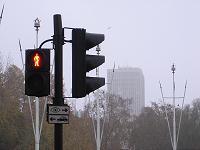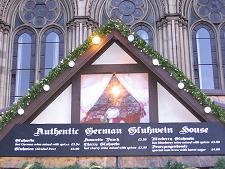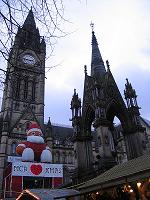British Christmas
 Veronika Schubert spends three months in Manchester, where she collects stories about language, people and everyday life to be told in backview. Staying with a lovely host family, she experienced her very first British Christmas.
Veronika Schubert spends three months in Manchester, where she collects stories about language, people and everyday life to be told in backview. Staying with a lovely host family, she experienced her very first British Christmas.
Christmas is over. Six weeks spent in great expectations of one prolonged weekend, six weeks awaiting Christmas. You could tell it was coming closer, you could tell from the fairy lights on Oxford Road, from the carols played at Sainsbury’s and from the crowds jamming Market Street.
Getting ready for Christmas
Already in November, the Christmas Markets had been set up in different locations all over the City Centre, and Town Hall had been besieged by an enormous, bubbly and illuminated Santa overlooking Albert Square. The weather turned winterly, icy, haly, sleety, while you would be chewing your Bratwurst and sipping your authentic German Gluhwein. And a warm feeling of German home would spread in my tummy, when I looked at the cosy wooden cabins and the stalls offering candles, woolly clothes and cheap jewellery.
By mid-December, everybody had started with the present-hunt, and the stream of people in the Arndale Centre was getting thicker and thicker each day. During the last week before Christmas, people even began to loose their patience and politeness. When before, the person on whose foot you stepped would apologise to you, they now would not give you more than an angry look when they bumped into you. Christmas had become the ultimate goal, the promise of joyful days with friends and family, the end of all work and all trouble.
 And then, Christmas was there. Suddenly, out of the blue. Awaited for so long and so dearly, it even seemed unreal when it eventually took place. The last day of work had been celebrated with a pretty pint, the last present had been purchased, the last shopping had been done. Christmas.
And then, Christmas was there. Suddenly, out of the blue. Awaited for so long and so dearly, it even seemed unreal when it eventually took place. The last day of work had been celebrated with a pretty pint, the last present had been purchased, the last shopping had been done. Christmas.
Christmas Eve
While German Christmas is basically over in about six hours (mass for those who like it, then dinner, then presents – and that’s it), British Christmas lasts for three days. On 24 December, you start with the cooking. You visit friends, exchange presents, have a Christmas Dinner, get into a festive mood and put an oversized stocking on your bedroom doorknob. To show your gratitude to Santa, you leave biscuits and sherry for him near the chimney, plus a carrot for Rudolph. This is Christmas Eve.
Christmas Day
On 25 December, the treat will be gone, and your stocking will brim with sweets and little somethings. Still in your pyjamas, you rush downstairs to check out the Christmas tree area. If you have been a good girl or a good boy, then Santa will have left huge piles of parcels under the tree for you. Somebody will provide some tea and toast, and thus starts a long day of unwrapping presents, playing with them, eating, watching telly, more unwrapping of presents, more playing, more eating, and more telly.
At three o’clock you can watch the Queen’s Speech, if you want to. There she is: Her Royal Majesty, standing in her living room, flanked by a well-proportioned Christmas tree on one side and a couple of family photos on a coffee table on the other side, radiating dignity. Her English is calm and pure, RP enough to show her impeccable standard, but not overly posh or condescending. She is wearing glasses, but does not hold a script in her hand. In a very polite and honest manner she tells you that friendship is an important thing at Christmas, that she has visited some other countries this year, that this has been a tough year for many people, and that it might be especially hard for them on Christmas Day with some of their loved ones missing, but that, if you trust in Jesus, everything will be fine. She looks wise, gentle and brave, and then the camera focuses on the family photographs sitting on the coffee table, and fades out.
Then again, food is prepared, and in the evening you sit down at a lovely decorated table and have dinner with your family of choice. For the first time in my life I cracked a Christmas cracker and got my own little gift, joke and paper crown or Christmas hat, and although we never had Christmas crackers in Germany, this was the moment that seemed the most familiarly Christmasy to me.
 Boxing Day
Boxing Day
And then comes Boxing Day, so called apparently because wealthy people used to give boxed presents to their servants on 26 December. Today, the most prominent quality of Boxing Day is the beginning of the Sales in most shops. You can observe the televised adverts change on 25 December, announcing special sales from the next day on, and as if people had not spent enough of their time shopping in the City Centre before Christmas, they will rise up very early in the morning to crowd Market Street again on Boxing Day. In terms of social events, Boxing Day is dedicated to a broader range of family and friends, and you might go to a party or throw one yourself to see all your grandparents, aunties and uncles and friends with their children. You chat, play, celebrate, and eat a lot.
Post-Christmas Recovery
Finally, on 27 December, everybody has gained half a stone from all the delicious food, is knackered from the lack of sleep and will be longing for a span of solitary time, walking in the park or reading one of their new books. Finally, Christmas is over!
(Text and pictures: Veronika Schubert)